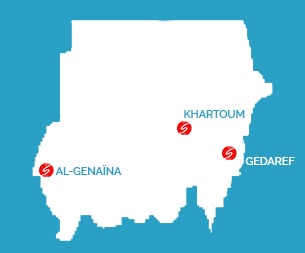
Context
This new conflict is taking place in a country already weakened by several crises. In 2021, 12.7 million people required humanitarian assistance in the country. Climate change and the economic crisis, with high inflation and rising prices for basic necessities, have also increased food insecurity and other needs.
The conflict between the SAF and the RSF complicates this situation. Since May 3, 2023, more than 736,000 people have been internally displaced. As of May 2023, nearly 117,116 Sudanese and people who sought refuge in Sudan were crossing the borders of neighboring countries (Chad, South Sudan, Egypt, Central African Republic, and Ethiopia).
Despite several ceasefires, fighting continued throughout the country, forcing the population to flee. Civilians are directly affected by the consequences of this crisis. While a third of the population was already dependent on humanitarian aid, they may no longer receive assistance without a significant increase in aid from the humanitarian community.
- 43 million inhabitants
- 172nd out of 191 countries on the Human Development Index
Our action

-
Mission
opened in 2004 (Darfour), 2020 -
Team
15 international staff
70 national staff - Budget 2.7M€
Before the onset of the conflict, SOLIDARITÉS INTERNATIONAL’s main objective in Sudan was to provide life-saving Water, Sanitation and Hygiene (WASH) services. As well as addressing urgent WASH gaps for the refugee population and host communities in Gedaref State.
Activities included providing access to safe drinking water for the population through water trucking and the construction of water points, as well as sanitation through the construction and maintenance of emergency sanitation facilities. Hygiene kits were distributed, and hygiene promotion activities were conducted to raise awareness of disease risks.
The violence of the ongoing conflict forces the NGO to adapt its actions to the context. The teams ensure the continuity of the water, hygiene, and sanitation programs and the reinforcement of the operations undertaken to provide an emergency response adapted to the needs of the local population.
In this context, SOLIDARITÉS INTERNATIONAL proposes an integrated emergency response to civilian victims of the conflict via three main areas:
- Equitable, adequate, and vital access to safe and sufficient water, sanitation and hygiene services ;
- Access to safe and dignified shelter and basic necessities ;
- Access to multi-sectoral assistance that meets the specific needs of populations.
Based on successful partnerships with local NGOs, SOLIDARITÉS INTERNATIONAL seeks to strengthen its engagement with civil society in this emergency response. The NGO has two operational teams, one in Gedaref, in the southeast of the country, and one in Al-Geneina, in West Darfur.
BHA, ECHO, CDCs, FH Soudan, UNICEF, IOM, Start Fund
Our impact

Water, sanitation and hygiene
– Construction of 60 latrines and 60 emergency showers
– Distribution of 1 000 hygiene kits
– Transport d’eau par camion en cours
– Constructions de points d’eau en cours
Should you have any questions, please contact Justine Muzik Piquemal.

In the world
Vacancies
At head office
Worldwide
Internships
